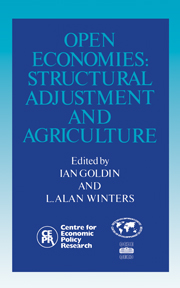Book contents
- Frontmatter
- Contents
- List of figures
- List of tables
- Preface
- Acknowledgements
- List of conference participants
- 1 Introduction: from macro to maize
- Part One Open economy analysis
- Part Two The small country assumption and trade reform
- Part Three Risk and adjustment
- 9 Markets, stabilisation and structural adjustment in Eastern European agriculture
- Discussion
- 10 Should marketing boards stabilise prices through forward purchases?
- Discussion
- Part Four Government's role
- Index
10 - Should marketing boards stabilise prices through forward purchases?
from Part Three - Risk and adjustment
Published online by Cambridge University Press: 04 August 2010
- Frontmatter
- Contents
- List of figures
- List of tables
- Preface
- Acknowledgements
- List of conference participants
- 1 Introduction: from macro to maize
- Part One Open economy analysis
- Part Two The small country assumption and trade reform
- Part Three Risk and adjustment
- 9 Markets, stabilisation and structural adjustment in Eastern European agriculture
- Discussion
- 10 Should marketing boards stabilise prices through forward purchases?
- Discussion
- Part Four Government's role
- Index
Summary
Stabilisation or hedging
The focus of discussion in international commodity policy in the decade immediately following the first OPEC price rise in 1973–4 was the negotiation of international commodity agreements (ICAs), in particular under the auspices of the UNCTAD Integrated Programme for Commodities. This process was almost totally unsuccessful, in part because the debate between the developed and the developing countries became politicised, and in part because the developed countries suspected, with some justice, that the so-called New International Economic Order (NIEO) would involve a move away from markets. The objective of stabilising prices at a level which was ‘fair to consumers and remunerative to producers’ suggested that these prices were likely to be higher on average than those which had prevailed under free market conditions.
Developed country suspicions about price stabilising agreements were enhanced by the performance of those agreements which were already operating. Five agreements were in place during this period, although not all were operational all the time. Two (cocoa and sugar) were completely ineffective. The coffee agreement was widely perceived as primarily a price-raising agreement – a coffee OPEC but both enforced and moderated by consumer representation. The tin agreement, which could claim a long history of successful stabilisation, was under-resourced in the 1980s and committed to defending what became (through the appreciation of the dollar) an absurdly high price – its spectacular collapse in 1985 was seen by many as the death knell of international stabilisation. Only the natural rubber agreement, the sole child of the UNCTAD programme, functioned reasonably efficiently.
- Type
- Chapter
- Information
- Open EconomiesStructural Adjustment and Agriculture, pp. 222 - 239Publisher: Cambridge University PressPrint publication year: 1992
- 2
- Cited by



